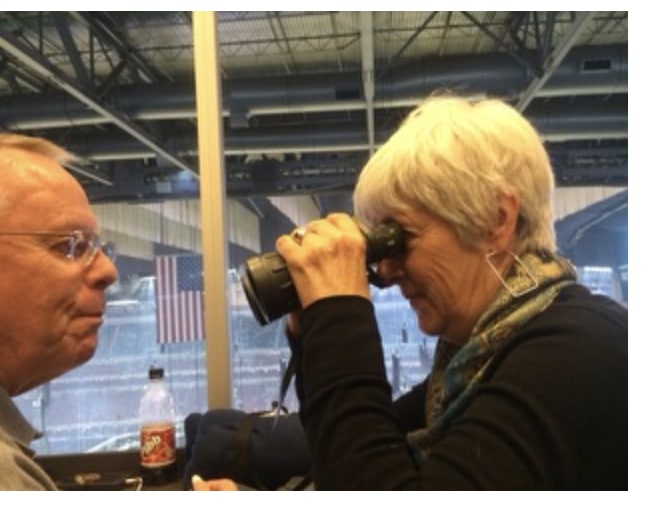I’m a huge fan of speechreading. I have to be – because if I couldn’t speechread, the hearing I do have would fall below the floorboards. (That’s why I’m trying so hard, in the above picture, to speechread my friend Ray Wathen and his full-blown Texas drawl.)
Actually, my hearing would be the same as always – not good – but my understanding of what someone is saying would be patchy, not complete, and I need help. My sense of sight acts as a communication partner to my sense of hearing. What I see on your face and in your body movements fill in the blanks of what I hear you saying.
Speechreading takes clues from a speaker’s eyes, eyebrows, mouth, teeth, tongue, and jaw movements as well as overall facial expressions and body language. It also uses context, so it helps to know what’s being talked about, which can be the hard part. This sounds almost painful, as if we’re staring you down with crazy eyes, but we do it so subtly and seamlessly that you may not realize that we’re doing it.
Prior to receiving my cochlear implant, I had only a whopping 2% speech discrimination from my right ear. This means I must have guessed right on 2% of the words because, hey, I’m not above cheating. But if I had been tested with speechreading allowed, I bet I could have hit 50% comprehension. Yes, speechreading has that kind of power!
Speechreading is not a practice limited to people with hearing loss. People with no discernible hearing challenges also speechread. For example, if someone isn’t being honest with us, their spoken words may not match their visual expressions, and we can pick that up through speechreading.
Your lips are smiling but your eyes are not.
You express sympathy but your eyes are dancing.
You say you’re OK, but your eyes are shiny with tears.
You say you believe me, but your eyebrows show fury.
I grew up with my hearing loss and learned to speechread by osmosis; no one taught me how to do it. Over time, my skill increased with my vocabulary and my habit of endless hours of watching people closely as they spoke. If a speaker turned away, I’d move with them. In the day of no assistive technology in the classroom, I understood teachers by sitting at the front of the class, literally under their noses. The view wasn’t always great, but it got me through school.
If your hearing loss has occurred in adulthood, you have moved to a new level of speechreading. In your days of good hearing, casual speechreading gave you information without your realizing it, but now you need to see a person’s face. Hearing loss has changed how you get your information.
Try a simple test. When someone is talking to you, turn away as they continue to speak. You may miss some of the words and you might become anxious. Then turn around and find out how much easier it is when there is eye contact. This exercise works better with someone you don’t know too well, because you so familiar with the speech patterns of your family and friends that you may not need to see their faces to chat.
People with hearing loss can benefit from a course to improve their natural speechreading skill. Almost all courses involve learning more about hearing loss in general as well as the many strategies, including technical ones, that can boost your understanding and communication. Courses help people to be better self-advocates, especially in explaining their communication needs to family and friends.
A good, well-taught course will also provide participants with some peace of mind that was lost along with their good hearing. What a relief to really understand that you’re not getting stupid, or careless, withdrawn or grumpy for no reason: you have hearing loss. And, as the saying goes, there’s an app for that. There is help!
It always amazes me what hearing people can hear, just as I suppose it amazes a hearing person what I often can’t hear. It’s also a challenge for them to realize how much we are speechreading them, which is one reason they forget our needs. They don’t see the daily dance we do in order to understand. When we start speechreading better, that dance gets easier. 25 years ago, I took a speechreading instructor course, which ignited my passion for hearing loss issues. Hearing loss became not just something I have, but what I do. When we understand our hearing loss, it becomes easier to deal and live successfully with it.
Do your hearing loss a favor; take a speechreading course. Contact your local hearing loss organization for courses, or the national organizations in North America such as hearingloss.org and chha.ca. Alternatively, try an online course such as the new one offered by the Canadian Hard of Hearing Association’s & Labrador Chapter.
Happy speechreading!








Like you, I learned myself speech reading unconsciously. Only 2 years ago, I went to a speech reading course here in Switzerland. Though I learned a lot (actually more about the Swiss-German language – my mother tongue is Dutch – then about speech reading) I decided to stop after a year. The prices went high and some of the participants were in the course for years … one or two even about 10 years! I doubt if that is useful. But I agree, for most of the people with hearing loss, a speech reading course can be very useful indeed.